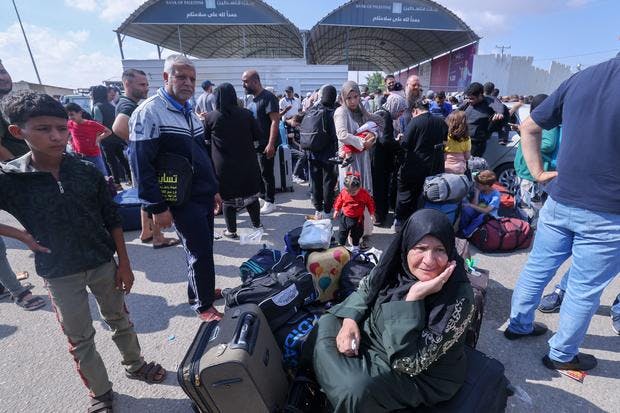Gaza Humanitarian Crisis Worsens; Biden Says Israelis 'Have To Go After Hamas'

The Israel-Hamas war is expected to ramp up with a looming Israeli ground invasion of Gaza, where a humanitarian crisis is deepening. Israel has pounded the Palestinian territory with airstrikes since Hamas militants fired barrages of rockets and stormed into the Jewish state on a murderous rampage last weekend.
In an interview with "60 Minutes," President Biden said "Israel has to respond. They have to go after Hamas," but warned that an Israeli occupation of Gaza would be "a big mistake."
The U.N. said almost a million Gaza residents have been displaced since the war started, with many following Israel's warning to flee to the southern half of the territory as food, water and fuel run short.
The only exit from Gaza, the Rafah border crossing into Egypt, remained closed Monday. Both Israel and Hamas denied reports of a temporary ceasefire in Gaza to enable humanitarian aid to enter in and foreigners to evacuate at the Rafah crossing.
The death toll on both sides of the war continues to climb. Israel's military said Hamas' attack and ongoing rocket fire from Gaza has killed more than 1,300 people, including at least 276 troops, and injured 3,200 others. In Gaza, the Health Ministry said Monday that Israeli airstrikes have killed at least 2,750 people and wounded at least 9,700.
The death toll includes 30 U.S. citizens, a State Department spokesperson confirmed Sunday, and 13 Americans remain unaccounted for.
The Israeli military said Sunday it has confirmed 155 people were taken captive by Hamas. A number of Americans are believed to be among them.
Israel, Hamas deny reports of temporary cease-fire
Israeli Prime Minister Benjamin Netanyahu's office and Hamas both denied reports Monday of a temporary ceasefire in Gaza to enable humanitarian aid to come in and foreigners to leave at the Rafah border crossing between Gaza and Egypt.
"There is currently no ceasefire and humanitarian aid in Gaza in return for removing foreigners," a statement from Netanyahu's office said.
Reuters cited Hamas official Izzat El Reshiq as saying there was no truth to reports about the opening of the Rafah border crossing or temporary ceasefire.
Israel orders evacuation of area near Lebanon border
The Israeli military has ordered people living in 28 communities near the Lebanese border to evacuate.
The order Monday comes amid increasing cross-border fire between Israel and the Lebanese Shiite militia Hezbollah.
The military order affects communities within 1.2 miles of the border.
Hezbollah has said the increased strikes were a warning and did not mean Hezbollah has decided to enter the war.
The Israeli army said Monday it was evacuating residents living along its northern frontier with Lebanon amid rising tensions there 10 days into its war with Hamas in the Gaza Strip.
According to Agence France-Presse, the army said in a statement that evacuees would be put up in "state-funded guesthouses."
Gaza humanitarian crisis deepens
More than a million people have fled their homes in the besieged Gaza Strip in the past week, ahead of expected Israel invasion that seeks to eliminate Hamas' leadership after its deadly Oct. 7 attack on Israel. The enclave's food and water supplies are dwindling, and its hospitals are warning that they are on the verge of collapse.
Israeli officials have given no timetable for a ground incursion that aid groups warn could hasten a humanitarian crisis in the coastal Gaza enclave.
About 500,000 people, nearly one quarter of Gaza's population, were taking refuge in United Nations schools and other facilities across the territory, where water supplies were dwindling, said Juliette Touma, spokesperson for the U.N.'s Palestinian refugee agency. "Gaza is running dry," she said. The agency says an estimated 1 million people have been displaced in Gaza in a single week.
With the situation in Gaza growing increasingly desperate, the U.S. named David Satterfield, the former U.S. ambassador to Turkey experienced in Mideast diplomacy, to be special envoy for Middle East humanitarian issues. U.S. national security adviser Jake Sullivan said Sunday that Satterfield will focus on getting humanitarian assistance to Palestinians in Gaza.
Hospitals in Gaza are expected to run out of generator fuel within two days, endangering the lives of thousands of patients, according to the U.N. Gaza's sole power plant shut down for lack of fuel after Israel completely sealed off the 25-mile long territory following the Hamas attack.
The World Health Organization expressed concern to The Associated Press about limited water and sanitation in the territory, particularly at hospitals where patients' lives can be lost due to infection and disease outbreaks. The WHO said four hospitals in northern Gaza are no longer functioning as a result of damage and 21 hospitals are under an Israeli evacuation order.
Biden agrees Hamas should be eliminated, says Israeli occupation of Gaza would be "a big mistake"
In an interview with "60 Minutes," President Biden said he agrees that Hamas needs to be eliminated.
"Yes, I do," Mr. Biden told "60 Minutes" correspondent Scott Pelley. "But there needs to be a Palestinian authority. There needs to be a path to a Palestinian state."
Given last weekend's terrorist attacks, the president acknowledged a two-state solution for Israelis and Palestinians is not possible at the moment.
"Not now. Not now. Not now, but— but I think Israel understands that a significant portion of Palestinian people do not share the views of Hamas and Hezbollah," he said.
Asked if he would support an Israeli occupation of Gaza, Mr. Biden said, "I think it'd be a big mistake. Look, what happened in Gaza, in my view, is Hamas and the extreme elements of Hamas don't represent all the Palestinian people."